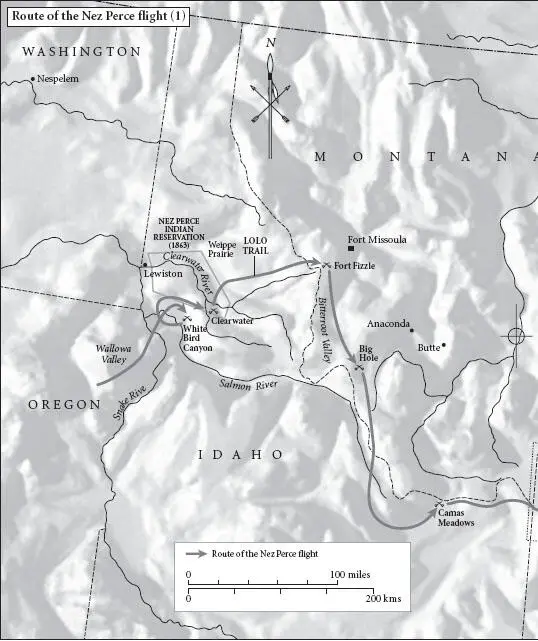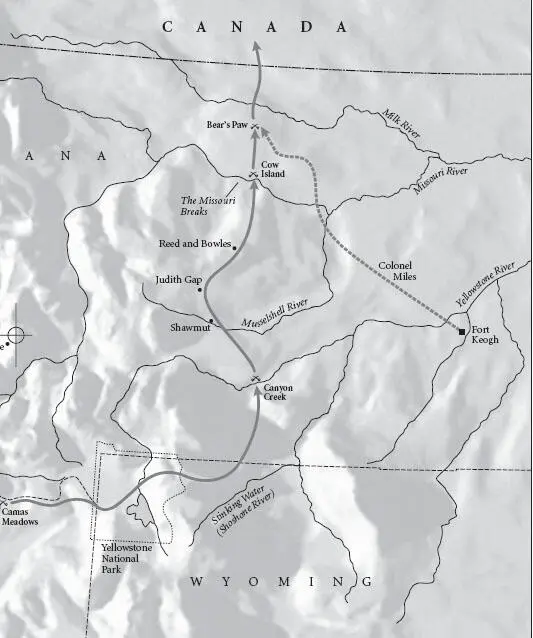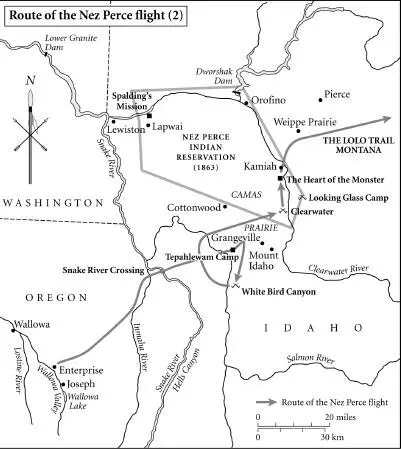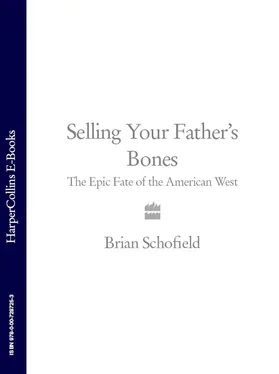SELLING YOUR FATHER’S BONES
The Epic Fate of the American West
BRIAN SCHOFIELD


Dedication
Epigraph
List of Illustrations
Prologue
Maps
1 Homeland
2 Settlement
3 Fever
4 Poison
5 Outbreak
6 Unequal War
7 To the Big Hole
8 Survival
9 Crescendo
10 Climax
11 ‘We’re Still Here’
Notes
Bibliography
Acknowledgements
Index
Copyright
About the Publisher
For my grandfather
‘I believe…that sooner or later…somewhere…somehow…we must settle with the world and make payment for what we have taken’
The Lone Ranger’s Creed
As THE SUN glowed red across the grassland, a group of children headed away from the village, through the willow trees, to squeeze a few more games from the fading daylight. The boys, mimicking their fathers, played with sticks and bones along the banks of the winding creek, their shrieks fading into the great expanse of the valley — until a chill cut through the air, and it was time to light a fire. The gang gathered wood and huddled close to the flames. Then, as an unfamiliar presence entered the circle of light, they fell to frozen silence. ‘Two men came there wrapped in grey blankets. They stood close, and we saw they were white men.’
The youngsters bolted towards the village in a panic, but when they looked back, the men in the grey blankets had disappeared -and they were soon forgotten as the games began again. Bed-time came, and the children lay down without sharing this unsettling sight with their elders.
That night, the village held a celebration, to mark a day of rest and calm, and good hunting amongst the dense herds of the grasslands. The seven hundred Nez Perce were many miles from home, they’d been travelling for almost two months to reach this riverbank, and they had still further yet to travel — but today, at least, they were at peace, and for that they gave thanks. The warriors paraded through the encampment, singing and drumming in the firelight, their blustering leader encouraging all to relax and enjoy the respite. Elsewhere, a younger chief tended to his own responsibilities, for the young and the old of the camp, the frail and the enfeebled. It was past midnight when the carousing ended, and the valley fell silent.
One hundred and eighty-three United States infantrymen crouched in the darkness and waited. The sleeping village was but a few hundred yards away, the embers of its fires still glowing, while the army shivered on the sloping meadow above, their discipline holding in the bleak, thin night — no cigarettes lit, no rifles dropped, not a sound. Hours passed. The dew soaked easily through the troopers’ threadbare uniforms, tightening the vice of cold. One man struck a match, and was slapped and shushed back into darkness by the soldiers around him.
The sounds of dogs barking and babies crying drifted over the willows and rushes from the dozing village. Just before dawn, a few women emerged from their tepees to refuel the campfires, enjoy a brief gossip and head back to their warm beds. And still the soldiers watched and waited.
At the very first greying of the sky, the troops began to move through the scrubland that lay between the high meadow and the riverbank, crawling and crouching forward, hiding behind the shallow rolls in the earth. A single line of men crept over the sodden ground — then stopped dead. Across the creek, an elderly man had emerged yawning from his lodge, cheerfully accepting that his sleep was complete. Mounting his waiting horse, the elder set off slowly towards the sloping meadow, to check on the village’s grazing herd. His eyes were beginning to wear with time, and he peered into the half-light as his horse forded the creek and strolled through the morning mist — heading straight towards the waiting army.
Fear coursed through the troops as the lone rider wandered closer to their ranks, a hundred yards distance shading to fifty, then thirty, twenty — and still the old man, blessed with a morning to himself, saw no sign of the long, thin line of rifles trained upon him. Ahead, lost in the mist, hearts raced and nerves strained. A cluster of untrained men, callow volunteers, were wound tightest of all — the old man was riding straight for the cleft in the earth where the five lay. He was just ten yards away now. Still he rode on, humming into the lifting gloom. Huddled against the soil, the volunteers heard each footstep approach, battling to summon their courage and keep their senses. The gap closed, and closed, barely five yards now.
The young men, breathless with panic, snapped. Leaping to their feet, they raised their rifles. Across the glistening valley, the deer and the antelope, the buffalo and the coyotes scattered into the distance, away from the echoing crack of gunfire.



‘These persons inculcate a sanctimonious reverence for the customs of their ancestors; that whatsoever they did, must be done through all time; that reason is a false guide’
THOMAS JEFFERSON, third President of the United States
‘I belong to the earth out of which I came’
TOOHOOLHOOLZOTE, Nez Perce leader
THIS IS HOW the people came to be.

Coyote was helping the salmon swim up the Columbia River, to ensure everyone would have plenty of fish to eat, when he first heard the shouts:
‘Why are you bothering with that? Everyone’s gone, the monster has them.’
The meadowlark told Coyote that everyone had been swallowed by the giant monster, to which he replied, ‘That is where I must go, too.’ He bathed his fur, to ensure he was as tasty as possible, and tied himself to three mountains with long ropes. On his back he put a pack containing five stone knives, some pitch and a fire-making kit. He then walked over the ridge to see the vast body of the monster stretching into the distance, and shouted his challenge: ‘Oh Monster, we are going to inhale each other!’
‘You go first,’ replied the monster, and Coyote breathed in with all his power, trying to swallow the monster, but could only make the beast quiver and shake a little. Next came the monster’s turn, and he breathed in like a roaring wind, lifting Coyote through the air towards him. As he flew, Coyote left camas roots and serviceberry bushes in the ground, saying, ‘We are near the time when the human beings will come, and they will be glad of these.’
Читать дальше


















